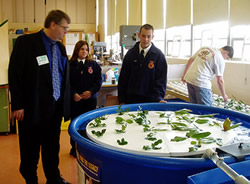Farmland Preservation
Agricultural Land Use Planning
Economic Development
Natural Resource Conservation
Agricultural Industry Sustainability
Planning for Agriculture Tool Kit
The New Jersey Department of Agriculture (NJDA) has created this tool kit to support municipal governments, businesses, non-profit groups, and local citizens in their efforts to achieve the goals and objectives outlined in the Agricultural Smart Growth Plan. The Tool Kit, like the Plan embraces the five linked components that we have identified as critical for the future of farming: Farmland Preservation, Innovative Conservation Planning, Economic Development, Agriculture Industry Sustainability and Natural Resource Conservation.
View the Agricultural Smart Growth Plan. [pdf 864k]
The information included in the Tool Kit is a resource to provide you with a starting point. Each community must assess its own strengths, weaknesses, and pressures to determine the tools that would be beneficial. The tools may be appropriate in concept but may need to be tailored to meet your community’s needs.
The NJDA also realizes that the Tool Kit does not contain all existing planning tools available. We welcome comments and suggestions to improve the Tool Kit.
To assist communities with other smart growth initiatives, here are the following links:
Office of Smart Growth
www.nj.gov/dca/osg/
State Development and Redevelopment Plan
www.nj.gov/dca/osg/plan/index.shtml
Farmland Preservation
| Permanently preserving privately owned productive agricultural land ensures a stable land base for the future of the agricultural industry. Farmland preservation, the foundation of the Agricultural Smart Growth Plan, is an important investment in our economy, our farming heritage and the overall quality of life for each and every New Jerseyan for generations to come. View "Farmland Preservation" Section of Smart Growth Plan [pdf 95k] |
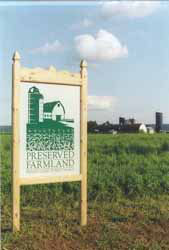 |
Agricultural Land Use Planning
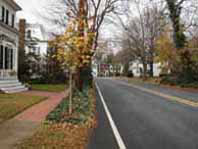 |
Under the innovative conservation planning approach, land conservation is the central organizing principle around which livable communities are created. Purchase of development rights programs coupled with innovative conservation planning efforts help New Jersey grow in ways that consume less land and strike a balance between preservation and growth. |
| View "Innovative Conservation Planning" section of Smart Growth Plan [pdf 288k] | |
| Stabilizing and fostering an active and productive agricultural industry is critical to retaining viable farms. Facilitating investments in agricultural infrastructure supports, maintains and expands the business of farming. At the same time, identifying and facilitating the creation of new markets helps farmers access an ever-changing marketplace. |
 |
| View "Economic Development" section of Smart Growth Plan [pdf 98k] | |
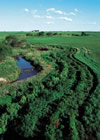 |
As stewards of the land, we must protect the quality of our environment and conserve the natural resources that sustain it by implementing conservation practices that improve water quality, conserve water and energy, prevent soil erosion and reduce the use of nutrients and pesticides. View "Natural Resource Conservation" section of Smart Growth Plan [pdf 97k] |
Agricultural Industry Sustainability
| Creating an environment that supports the agricultural industry at the municipal, county and state levels demonstrates that agriculture is a preferred land use in New Jersey and encourages the retention of thriving and diverse farming operations. Educating the next generation of farmers, welcoming newcomers and ensuring | 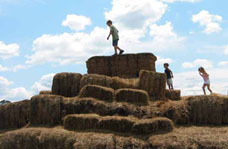 |
| the safety and well-being of today's farm workers are critical components of maintaining a profitable, strong agricultural industry poised for a bright future. View "Agricultural Industry Sustainability" section of Smart Growth Plan [pdf 95k] |
|
Farmland Preservation
Farmland preservation, the foundation of the Agricultural Smart Growth Plan, is an important investment in our economy, our farming heritage and the overall quality of life for each and every New Jerseyan for generations to come.
For more information on state initiatives to preserve farmland and the various programs available:
www.nj.gov/agriculture/sadc/index.shtml.
For information on a specific county and their farmland preservation initiatives click on the link below:
www.nj.gov/agriculture/sadc/farmpreserve/contacts/cadbs.html
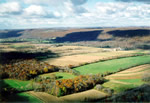 |
Farmland Preservation Project Area Washington Township, Morris County |
Strategic Targeting Process
New Jersey is a national leader in preserving its farmland, in confronting legendary development pressures and in promoting “smart growth.” A more strategic approach to prioritizing farmland preservation investments, coordinated by the State Agriculture Development Committee (SADC), will insure that all levels of government make the most efficient and effective use of available resources in securing a bright future for farming and the agricultural industry.
The SADC / CADB Farmland Preservation Strategic Targeting Process has three primary goals:
1. To coordinate farmland preservation / agricultural retention efforts with proactive planning initiatives,
2. To update / create maps used to target preservation efforts, and
3. To coordinate farmland preservation efforts with open space, recreation and historic preservation investments.
Click here to view the Strategic Targeting Project's March 2003 preliminary report.
SADC Farmland Preservation Programs
County Planning Incentive Grant Program
The State Agriculture Development Committee has developed this new program as an alternative to the traditional County Easement Purchase Program. Landowners apply to counties to sell their development rights. Counties submit to the SADC comprehensive farmland preservation plans that detail not only their plans for farmland preservation but their strategies for sustaining the agricultural industry. Once the SADC has approved a county's comprehensive farmland preservation plan, counties are eligible for a block-type grant that can be used to preserve any of the eligible farms listed in its plan.
www.nj.gov/agriculture/sadc/farmpreserve/programs/countyPIG.html
Municipal Planning Incentive Grant Program
The State Agriculture Development Committee provides grants to eligible counties and municipalities to purchase development easements for permanent preservation of farmland in designated municipal project areas. The development of municipal comprehensive farmland preservation plans is a requirement for participation in this program. Participating municipalities and counties with approved plans are eligible for a block-type grant that can be used to preserve any of the eligible farms listed in their plan.
www.state.nj.us/agriculture/sadc/farmpreserve/programs/municipalPIG.html
Traditional County Easement Purchase Program
Landowners apply to counties to sell their development rights. Counties submit applications to the SADC, and applications from each county compete with others from across the state. The SADC provides cost-share grants to assist in the preservation of the highest-ranked farms statewide.
www.state.nj.us/agriculture/sadc/farmpreserve/programs/easement.html
State Acquisition Program
The State Agriculture Development Committee directly purchases development rights or farmland outright from willing landowners.
State Acquisition Factsheet [.pdf]
- Direct Easement
The state purchases the development rights on farmland directly from the landowner, and the landowner retains ownership of the land.
Direct Easement Purchase Application [.doc]
Direct Easement Purchase Application Guide [.pdf]
- Fee Simple
Farms are purchased outright from willing sellers, permanently preserved for agricultural use and resold or leased with deed restrictions attached.
Fee Simple Application [.doc]
Fee Simple Application Guide [.pdf]
Grants to Nonprofits
The state provides cost-sharing grants of up to 50 percent to assist nonprofit organizations in permanently preserving farms.
www.state.nj.us/agriculture/sadc/farmpreserve/programs/nonprofit.html
Eight Year Program
An eight-year program allows landowners to voluntarily restrict nonagricultural development on their property for eight years in exchange for selected easement -purchase benefits, such as protection from emergency water restrictions and access to soil and water conservation matching grants.
www.nj.gov/agriculture/sadc/farmpreserve/programs/eightyearprogram.pdf
Farm Link
The Farm Link program serves as a resource and referral center for new farmers, farmers seeking access to land and farming opportunies, landowners seeking farmers, and farmers working on estate and farm transfer plans. The program offers a linking service to help connect farm owners and farm seekers, with the result being farm leases, partnerships, apprenticeships, work-in arrangements, and standard sales.
If you are interested in the Farm Link program, the following link will provide more information:
www.nj.gov/agriculture/sadc/farmlink/
For links to other non-profit organizations involved with land preservation, please click below:
New Jersey’s Environmental Center
http://njenvironment.org/landpreservation.htm
![]()
Agricultural Land Use Planning
Agricultural Land Use Planning
Under this approach, land conservation is the central organizing principle around which livable communities are created. Purchase of development rights programs coupled with innovative conservation planning efforts help New Jersey grow in ways that consume less land and strike a balance between preservation and growth.
Is Your Town Farm Friendly?
The New Hampshire Coalition developed the checklist at the link below for communities to rate themselves. How do you rate?
http://cecf1.unh.edu/sustainable/farmfrnd.cfm
Balancing Growth with Preservation
A goal of the New Jersey Department of Agriculture is to encourage counties to coordinate farmland preservation and agricultural retention efforts with local proactive planning initiatives. The links below will direct you to options such as clustering, planned unit development and neo-traditional neighborhood development.
Pace Law School
www.pace.edu/page.cfm?doc_id=23239
The Center for Rural Massachusetts conducted a study to determine the market appreciation effects between cluster developments with associated open space as compared to conventional housing development. To view the interesting results:
www-unix.oit.umass.edu/~ruralma/LacyMarket.html#RTFToC2
Links to State Grant and Loan Programs That May Assist with Smart Growth Planning Initiatives

Department of Environmental Protection
Green Acres Grants and Loan Programs
www.nj.gov/dep/grantandloanprograms/nhr_gagl.htm
Green Acres Non Profit Grants and Loan Programs
www.nj.gov/dep/grantandloanprograms/nhr_gana.htm
Additional grant and loan programs available through the Department of Environmental Protection:
www.nj.gov/dep/grantandloanprograms/
Local Tools for Historic Preservation
www.nj.gov/dep/hpo/3preserve/local.htm#grants
 Department of Community Affairs
Department of Community Affairs
Office of Smart Growth Grants and Resources
www.nj.gov/dca/osg/resources/grants/index.shtml
The Office of Smart Growth also offers the publication Designing New Jersey. This publication presents the State Plan’s design statement in a visually compelling 80 page handbook. New Jersey is the first state in the nation to include design strategies and guidelines in its growth-management tool kit. For your copy of Designing New Jersey, contact the Office of Smart Growth at (609) 292-7156.
Division of Housing and Community Resources
Housing and Neighborhood Revitalization Grants
www.state.nj.us/dca/grants/index.html
 Department of Transportation, Community Programs
Department of Transportation, Community Programs
Transit Village Initiative
Context Sensitive Design
Local Aid and Economic Development
New Jersey FIT: Future In Transportation
Safe Routes to School
Scenic Byways in New Jersey
Transfer of Development Rights (TDR)
Transfer of Development Rights (TDR) is a planning technique that allows local municipalities the ability to transfer growth out of targeted areas for preservation -- commonly referred to as sending areas --and relocate it into compact defined areas of development -- also known as receiving areas. For more information click on the links below:
State Agriculture Development Committee
www.nj.gov/agriculture/sadc/tdr/
Chesterfield Township, Burlington County: A successful local Transfer of Development Rights Program
www.chesterfieldtwp.com/Smart%20Growth/Smart%20Growth.htm
TDR: Beyond Takings and Givings
www.beyondtakingsandgivings.com/
American Farmland Trust: Use of Transfer of Development Rights on the Rise
www.farmland.org
Increasingly, states and local communities are utilizing transfer of development rights (TDR) programs to shift development from important agricultural areas to designated growth zones closer to municipal services. The programs provide market incentives for developers to purchase TDR credits from willing landowners. TDR programs also offer a low-cost, politically acceptable mechanism for agricultural land protection that doesn't rely on public funding. AFT's Farmland Information Center provides a compilation of the 27 state enabling laws and 32 local ordinances for TDR programs across the country
Farmland Information Center www.farmlandinfo.org
Build Out Analysis/Carrying Capacity
A build-out analysis will assist communities to understand what the current zoning will permit if built to capacity and identify changes needed in local master plans, zoning ordinances and development regulations. A carrying capacity analysis takes the build-out study a step further by analyzing the capacity of the environmental and the infrastructure systems. The link below will prove to be helpful:
Association of New Jersey Environmental Commission
www.anjec.org/pdfs/SG_Planning.pdf
Goal-Oriented Zoning
Goal-Oriented Zoning (GOZ) is a computer program that utilizes geographic information system technology to calculate the impacts of “build-out” under alternative zoning scenarios. The Regional Planning Partnership staff ahs designed GOZ in order to improve planning practice by providing an affordable, accessible, and easy to use tool for informing planning decisions. To learn more about GOZ, click on the following link:
www.planningpartners.org/services.html
Country Code
Some communities have adopted policies that express a philosophy that represents the residents’ desires and commitment to maintain a rural atmosphere. The code informs new residents or those considering moving to the community what they may expect because of the “rural atmosphere”. Upper Freehold Township in Monmouth County has adopted such a code.
Click here to view Upper Freehold Township's "Country Code" ordinance.
Cost of Community Services Studies
Cost of Community Services Studies (CCSS) compare annual revenues to annual expenses for various land use categories. Additional information can be found at these sites:
American Farmland Trust
www.farmlandinfo.org/documents/27757/FS_COCS_11-02.pdf
Community Guide to Development Impact Analysis
www.lic.wisc.edu/shapingdane/facilitation/all_resources/impacts/analysis_cost.htm
Leadership in Energy and Environmental Design(Leed)
The LEED (Leadership in Energy and Environmental Design) Green Building Rating System® is a voluntary, consensus-based national standard for developing high-performance, sustainable buildings. Members of the U.S. Green Building Council representing all segments of the building industry developed LEED and continue to contribute to its evolution. LEED standards are currently available or under development for:
- New commercial construction and major renovation projects (LEED-NC)
- Existing building operations (LEED-EB)
- Commercial interiors projects (LEED-CI)
- Core and shell projects (LEED-CS)
- Homes (LEED-H)
- Neighborhood Development (LEED-ND)
LEED
www.usgbc.org/DisplayPage.aspx?CategoryID=19
The Willow School is situated in the beautiful New Jersey countryside on a spectacular 34-acre forested site. The school buildings incorporate many environmentally sensitive design features, allowing the school to seek a high level of certification from the United States Green Building Council in the Leadership in Energy and Environmental Design (LEED) program. To learn more click on the links below:
The Willow School: www.willowschool.org/campus/environment.htm
New Jersey's LEED Certified/Registered Projects: www.usgbc.org/LEED/Project/CertifiedProjectList.aspx
Lincoln Institute of Land Policy
A non-profit and tax-exempt educational institution established in 1974. Its mission as a school is to study and teach land policy, including land economics and land taxation. The Institute's goals are to integrate theory and practice to better shape land policy and to share understanding about the multidisciplinary forces that influence public policy. For more information or to view their publications including their most recent Land Lines newsletter, click on the link below:
http://lincolninst.edu/
 Protecting Water Resources with Smart Growth
Protecting Water Resources with Smart Growth
EPA has released a new report that will help communities protect water resources and achieve smart growth. The report documents 75 innovative approaches - including redeveloping abandoned properties, encouraging rooftop gardens, creating shared parking, and promoting tree planting - that state and local governments and water quality professionals can use to achieve their smart growth and water quality goals. For additional information on other resources available through the United State Environmental Protection, click on the following link:
http://epa.gov/smartgrowth/
Hunterdon County Toolbox
The Hunterdon County Toolbox was created by Freeholder Marcia Karrow as a means to develop science-based environmental ordinances for use by Hunterdon County municipalities. This was done in direct response to repeated requests for assistance from local officials across the County who were looking for tools to better manage growth and ensure environmentally responsible development. Although the Environmental Toolbox begun as an initiative for Hunterdon County municipalities, we believe that communities in many other parts of New Jersey will find these ordinances applicable.
The Toolbox was overseen by a Committee that included local officials, County and State agency representatives, land use attorneys, engineers, scientists, planners, landscape architects, foresters, and representatives from both the environmental and agricultural communities. The Committee reviewed and endorsed the ordinances created by nine subcommittees. Ordinances underwent thorough debate, revision, and scrutiny by diverse interests in order to ensure they were legally sound, scientifically valid and responsive to the concerns of the diverse interest groups that would ultimately be affected by them.
To view the model ordinances, click on the following link:
www.co.hunterdon.nj.us/planning/toolbox.htm#ordinances
Transportation and Land Use
The New Jersey Department of Transportation (NJDOT) has initiated a process with Warren County planners and community residents to develop a coordinated land use and transportation plan for the 21 mile Route 57 corridor between Phillipsburg and Hackettstown.
The study area includes the eight municipalities that border Route 57 and due to the proximity of Route 57 to Washington Township in Morris County, representatives from that municipality are also participating in the plan. The study area is not simply the roadway portion of Route 57, but includes the surrounding land uses, which are an integral part in maintaining the current rural character of the area.
NJDOT is taking a proactive approach to ensure the long-term effectiveness of Route 57 as a two-lane rural road by coordinating plans and funding for land development, preservation, and transportation improvements with local planners and municipalities.
The project is one of several "smart growth" case studies NJDOT is conducting to identify best practices for integrating land use and transportation plans. To view the Route 57 Corridor Plan, please click on the following link: www.state.nj.us/transportation/works/studies/rt57
![]()
Economic Development
Economic Development section of Smart Growth Plan
| Stabilizing and fostering an active and productive agricultural industry is critical to retaining viable farms. Facilitating investments in agricultural infrastructure supports, maintains and expands the business of farming. At the same time, identifying and facilitating the creation of new markets helps farmers access an ever-changing marketplace. | 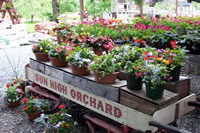 |
Economic Development Strategies
NJDA has developed strategies to enhance the significant contribution agriculture makes to the state’s economy. Strategies have been developed for each specific sector of the agricultural industry.
2008 Economic Development Strategies
NJDA also offers financial assistance through various grant and loan programs. To view and access information on these programs, click on the link below:
Grants
Branding Opportunities for New Jersey Farmers and Fishermen
 |
 |
 |
|
Jersey Fresh Point-of-Sale Materials
Fishermen and farmers are invited to use the Jersey Fresh brand name. For the past twenty years the New Jersey Department of Agriculture has worked to establish produce industry and consumer brand recognition for the Jersey Fresh brand, which now also extends to Jersey Grown, Jersey Bred and Jersey Seafood. The logo artwork and Jersey Fresh price cards, twists ties, stickers, banners, pennants and t-shirts are all available from the Department of Agriculture. Order forms for Jersey Fresh point-of-sale material are available at:
www.nj.gov/agriculture/divisions/md/pdf/pointpurch.pdf
Marketing Opportunities for New Jersey Farmers
Community Farmers Markets
In just the past two seasons, the NJDA has helped to develop new tailgate markets in eighteen communities. The NJDA helps both growers and communities find the right partners in developing new community markets. At these markets, consumers can purchase locally-grown produce and other agricultural products directly from New Jersey farmers. The markets provide access to fresh fruits and vegetables in urban centers and attract consumers, stimulating commerce in surrounding businesses. The markets help farmers stay viable, maintaining their farmland as open space, benefiting all New Jersey residents. To locate current community farmers markets:
www.state.nj.us/jerseyfresh/searches/urban.htm
Department of Corrections Purchases
The Department of Corrections can now make direct purchases of over produced and under valued New Jersey agricultural products. The Department is working to register eligible farmers for this program.
Retail Supermarkets
The Department of Agriculture works very aggressively to maintain close communications with the area’s supermarket retailers. Through office visits, special events, weekly e-mails, trade shows, and advertising, the NJDA closely coordinates our efforts to ensure market access for New Jersey growers to the retail supermarket industry.
Third-Party Farm Certifications
The NJDA provides affordable third-party farm certifications to assist growers in documenting good production practices. This voluntary food safety program ensures that participating producers are following good agricultural and handling practices, which provides important assurance to their regional and national buyers, as well as consumers.
Ethnic Market Research
The NJDA, in cooperation with Rutgers University, is working to analyze the market for ethnic produce in New Jersey and identify opportunities for farmers in the region to supply new products for these emerging markets.
Food Service Marketing
The Department is developing a new program to work closely with the Hotel Restaurant and Institutional food service industries. To increase local purchases, supplier directories and point of advertising will be provided to the industry.
| Agri-Tourism Agri-Tourism presents opportunities for New Jersey growers seeking to add value to their crops and capture more of their product’s market price. The Department is working closely with the Office of Travel and Tourism to establish an Agri-Tourism Council that will develop and implement a marketing plan to promote all aspects of New Jersey Agri-Tourism |
 |
| directly to consumers. Agri-tourism is one of the Department's 10 economic development strategies: 2008 Agri-Tourism |
|
The links below will assist agricultural producers and municipalities in gaining a better understanding of how agriculture can play an important role as a tourist destination within a community.
United State Department of Agriculture: www.nal.usda.gov/ric/ruralres/tourism.htm
NJDA, Division of Marketing and Development: www.nj.gov/agriculture/divisions/md/
Virginia Cooperative Extension: www.ext.vt.edu/pubs/agritour/310-003/310-003.html
University of California Small Farms Center: www.sfc.ucdavis.edu/agritourism/factsheets/what.html
For more information on NJDA Marketing Assistance, visit the below link:
www.nj.gov/agriculture/divisions/md/
The Department of Agricultural & Resource Economics of The University of Arizona has designed a guide to help farm operators (and other individuals who grow or process food products) market their products and services directly to the consumer.
http://ag.arizona.edu/arec/pubs/dmkt/dmkt.html
USDA Rural Development
Rural Development is the name of the U.S. Department of Agriculture mission area responsible for economic and community development in the small towns and rural areas across America. Rural Development programs are administered through three service agencies, The Rural Housing Service (RHS), The Rural Utilities Service (RUS), and The Rural Business-Cooperative Service (RBS) in New Jersey.
Below is the link to the programs offer by the USDA:
www.rurdev.usda.gov/nj/
![]()
Natural Resource Conservation
Natural Resource Conservation section of Smart Growth Plan
| As stewards of the land, we must protect the quality of our environment and conserve the natural resources that sustain it by implementing conservation practices that improve water quality, conserve water and energy, prevent soil erosion and reduce the use of nutrients and pesticides. |  |
State Soil Conservation Committee
The New Jersey Department of Agriculture helps to protect and conserve the state's soil, water and related natural resources through the stewardship efforts of its natural resource conservation program. The program offers technical, financial and regulatory assistance and provides educational outreach to landowners throughout the state. The State Soil Conservation Committee (SSCC) administers the natural resources conservation program.
www.nj.gov/agriculture/divisions/anr/nrc/soil.html
NewJersey Natural Resource Conservation Service
The Natural Resources Conservation Service (NRCS) provides assistance to communities, private landowners and farmers in the conservation and management of their soil, water, and other natural resources.
The link below will provide information on how a community may benefit from NRCS:
www.nj.nrcs.usda.gov/
For the farming community, NRCS can provide assistance with planning through the development of a Conservation Plan. The Conservation Plan is a formal written plan with recommendations of management decisions and conservation practices for a given farm. In a unique state and federal partnership, NRCS will also provide annual rental payments and cost-share assistance in return for installing specific conservation practices.
For a list of available programs, please click on the site below:
www.nj.nrcs.usda.gov/programs/
Soil and Water Conservation Grants
www.nj.gov/agriculture/grants/soil.html
The State Agriculture Development Committee (SADC) provides cost-sharing grants to landowners in the permanent or eight-year preservation programs to fund approved soil and water conservation projects. These projects not only protect soil and water resources, but increase productivity and profitability for the farmer. Projects include terrace systems; diversions; water impoundment reservoirs; irrigation systems; sediment retention, erosion or water control systems; drainage systems; animal waste control facilities; and land shaping and grading.
Energy Programs
New Jersey Clean Energy Program: Provides financial incentives (rebates of 30% - 70% of system costs) to owners who install qualifying clean energy generation systems such as fuel cells, photovoltaics (solar electricity), small wind and sustainable biomass equipment.
www.njcep.com/
Biomass Research and Development Initiative Grants: Up to $15 million is available through the United States Departments of Agriculture and Energy to support the President's energy plan to develop renewable energy and expand the economic prospects and environmental benefits of biomass. These grants are available to eligible entities to carry out research, development and demonstrations on biobased products, bioenergy, biofuels, biopower and related processes. This funding opportunity is intended to promote greater innovation and development related to biomass, and to support Federal policy calling for greater use of biomass-based products, feedstock production, and processing and conversion. The focus of this year’s grant program is on development and demonstration projects that lead to greater commercialization.
Click here to apply.
Click here for more details.
New Jersey SmartStart Building: Can be implemented when starting a commercial or industrial project from the ground up, renovating existing space, or upgrading equipment. SmartStart Buildings can provide a variety of free support to yield substantial savings in the short and long term. If an interested party contracts with an outside firm to implement a full-phase energy audit, the utility can pay up to 50 percent of the study cost with a maximum reimbursement of $10,000.
www.state.nj.us/njbusiness/financing/clean/smartstart.shtml
Motor-Up Premium Efficiency Initiative: Combines cash rebates, end user education and motor management tools for qualified motors.
www.appliedproactive.com/motors.html
Farm Bill Programs
Conservation Reserve Program (CRP): Provides technical and financial assistance to farmers/producers to address the agricultural impacts on water quality and to maintain and improve wildlife habitat. CRP practices include the establishment of filter strips, riparian buffers and permanent wildlife habitats.
www.nrcs.usda.gov/programs/CRP/
Environmental Quality Incentive Program (EQIP): Provides technical, financial, and educational assistance to farmers/producers for conservation practices that address natural resource concerns, such as water quality. Practices under this program include integrated crop management, grazing land management, well sealing, erosion control systems, agri-chemical handling facilities, vegetative filter strips/riparian buffers, animal waste management facilities and irrigation systems.
www.nj.nrcs.usda.gov/programs/eqip/index.html
Wetlands Reserve Program (WRP): Designed to address the restoration of previously farmed wetlands. Easements are purchased for a 10-year, 30-year, or permanent duration. www.nj.nrcs.usda.gov/programs/wrp/
Wildlife Habitat Incentives Program (WHIP): Assists landowners with habitat restoration and management activities specifically targeting fish and wildlife, including threatened and endangered species.
www.nj.nrcs.usda.gov/programs/whip/
Grassland Reserve Program (GRP): Offers landowners the opportunity to protect, restore, and enhance grasslands on their property.
www.nj.nrcs.usda.gov/programs/grp/index.html
Agricultural Management Assistance (AMA): Provides cost-share assistance to agricultural producers to address risk management concerns linked to water management, water quality and erosion control issues.
www.nj.nrcs.usda.gov/programs/ama/
Conservation Reserve Enhancement Program (CREP): Provides cost-share assistance and rental/incentive payments to agricultural producers for the installation and maintenance of conservation practices (buffers, filter strips) on agricultural lands that are currently cropped and located adjacent to waterbodies.
www.state.nj.us/dep/watershedmgt/crep.htm
![]()
Agricultural Industry Sustainability
| Agricultural Industry Sustainability section of Smart Growth Plan Creating an environment that supports the agricultural industry at the municipal, county and state levels demonstrates that agriculture is a preferred land use in New Jersey and encourages the retention of thriving and diverse farming operations. Educating the next generation, welcoming newcomers and ensuring the safety and well-being of today’s farm workers are critical components of maintaining a profitable, strong agricultural industry poised for a bright future. Click here for Sustainable Agriculture: Information Access Tools |
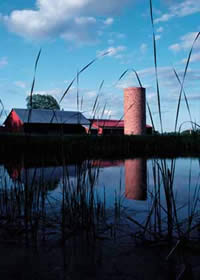 |
Right To Farm
New Jersey has seen an influx of development in what were traditionally agricultural areas. In some instances, local governing decisions are made to address this growth but may constrain agricultural operations or significantly increase operating costs of farming. The Right to Farm Act provides commercial farm owners or operators with certain protections from restrictive municipal ordinances and public/private nuisance actions.
For information on Right to Farm , click below:
www.nj.gov/agriculture/sadc/rtfprogram/
Farmland Assessment
The Farmland Assessment tax incentive has been instrumental in helping New Jersey retain productive farmland.
The link below provides the eligibility requirements and other pertinent information on Farmland Assessment:
http://www.nj.gov/agriculture/divisions/anr/pdf/farmlandassessmentoverview.pdf
Transferring the Family Farm
The State Agriculture Development Committee offers a publication to assist farm families in undertaking the planning needed to ensure they can successfully transfer the farm to the next generation. "Transferring the Family Farm: What Worked, What Didn't for 10 New Jersey Families"offers real-life profiles of families who describe their successes and challenges, as well as what they learned and what resources proved valuable, as they planned for and undertook the transfer of their land and agricultural operations.
www.nj.gov/agriculture/sadc/publications/transferprofilesbooklet.pdf
Agriculture Education and New Farmers
Equipping the next generation to lead and manage the agricultural industry is vital to ensuring that agriculture continues to thrive. Having instructional programs available in our schools provides students with options beyond the standard curriculum.
The next generation of farmers also includes individuals who are considering changing careers to start a new farm business or operation. It is important to equip these people, who often do not come from agricultural backgrounds, with the resources they need to succeed.
Click below to learn more:
Ag Education: www.jerseyageducation.nj.gov/
Resources for New and Aspiring Farmers: www.nj.gov/agriculture/sadc/farmlink/resources/newfarmers.html
|
Rutgers Cooperative Extension |
Rutgers Cooperative Extension (RCE) helps the diverse population of New Jersey adapt to a rapidly changing society and improve their lives through an educational process that uses science-based knowledge. RCE focuses on issues and needs relating to agriculture and the environment; management of natural resources; food safety, quality, and health; family stability; economic security; and youth development. www.rce.rutgers.edu/ |


